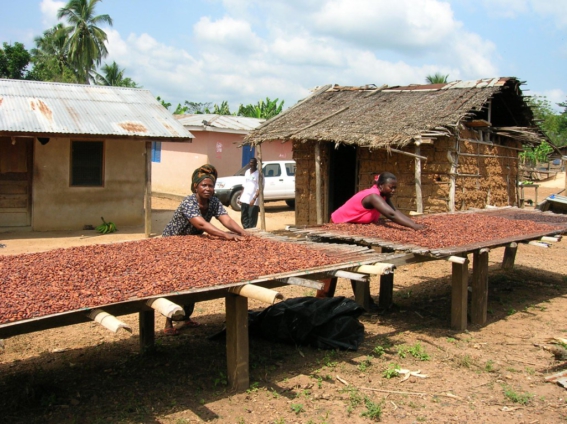Ghana, along with its neighboring cocoa powerhouses, has been grappling with an outbreak of black pod disease—a dreaded menace that causes cocoa pods to blacken and rot.
This has led to a rise in cocoa prices to a 13-year high, leaving farmers and experts grappling with the grim reality of a diminished harvest and compromised bean quality.
The disease has the potential to severely impact both the quality and quantity of cocoa beans produced. Fuad Mohammed Abubakar, the head of Ghana Cocoa Marketing Co., speaking to Bloomberg warned that the disease can prove catastrophic for the cocoa supply.
The leading cocoa-producing countries including Ivory Coast, Ghana and Nigeria, have witnessed a decline in cocoa shipments.

According to reports, Ivory Coast farmers have exported approximately 2.24 million tons of cocoa in the current season, slightly less than the 2.29 million tons recorded the previous year. The situation is causing ripples across the global cocoa market, with concerns about a potential shortage in supply and subsequent price hikes.
Reflecting the challenges faced by the cocoa industry in Ghana and West Africa, cocoa futures in London have soared by over 20% this year. Most-active futures reached £2,544 a ton, a figure not seen since mid-2010. In New York, cocoa futures also climbed 1.7% to $3,412, highlighting the global market's growing concern over the supply situation.
The situation is said to be mainly caused by heavy rainfall across West Africa, which has disrupted the harvest and exacerbated the spread of the black pod disease.
This weather phenomenon, characterized by hot and dry conditions, poses a significant risk to cocoa production.
This worrying trend is fueling fears that the anticipated smaller harvest may not be sufficient to make up for the shortfall experienced during the main crop harvest.
Ghana, alongside other West African nations, relies heavily on the two annual cocoa harvests to sustain its economy and meet global cocoa demands.
Sola Ogunsola, a Nigerian farmer, laments the impact on coastal cocoa farms, where many developing pods have been lost to the disease.
In addition to damaging the crops, the torrential rain has made roads impassable, hindering the transportation of chemicals for plantation treatment and cocoa delivery to ports.
Latest Stories
-
Director urges parents to protect children from abuse
30 mins -
Imani-Ghana criticises Akufo-Addo for not lauding Fourth Estate’s contribution to social development
37 mins -
Man remanded for allegedly stabbing businessman with broken bottle and screwdriver
1 hour -
Population in Kumasi Central Prison surges to 1800, threefold exceeding capacity
1 hour -
NPP to conduct La Dadekotopon parliamentary primary today
1 hour -
KPMG’s report on GRA and SML deal, government white paper on report and matters arising
1 hour -
I won’t reply to Chris Brown tour criticism – Ayra Star
1 hour -
British Columbia to back off drug decriminalisation project
1 hour -
Veteran commentator Joe Lartey Sr dies at 96
1 hour -
Livestream: Newsfile discusses KPMG report on SML deal, ILO on SSNIT reserves and NDC’s running mate
2 hours -
Ghanaian activist hugs over 1,100 trees in an hour to set Guinness World Records
2 hours -
Mathew Anim Cudjoe’s Dundee United promoted to Scottish Premiership after Championship win
2 hours -
NSMQ star Jochebed Adwoa Sutherland sweeps 12 awards at UG Vice-Chancellor’s Ceremony
3 hours -
Ghana’s Education Quality ranked 125 out of 183 countries in latest Global Youth Development Index
3 hours -
Emma Stone wants people to use her real first name
3 hours

